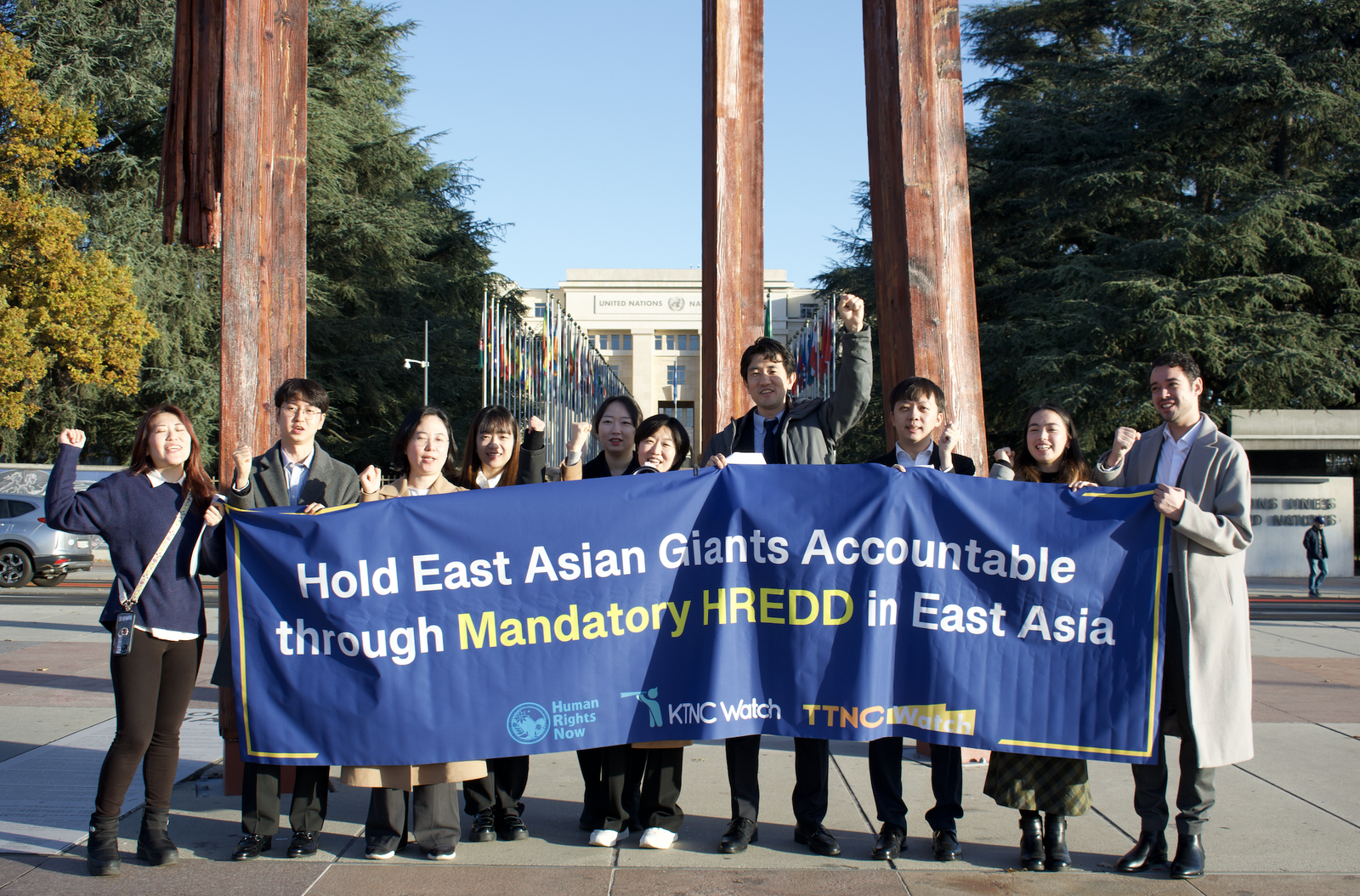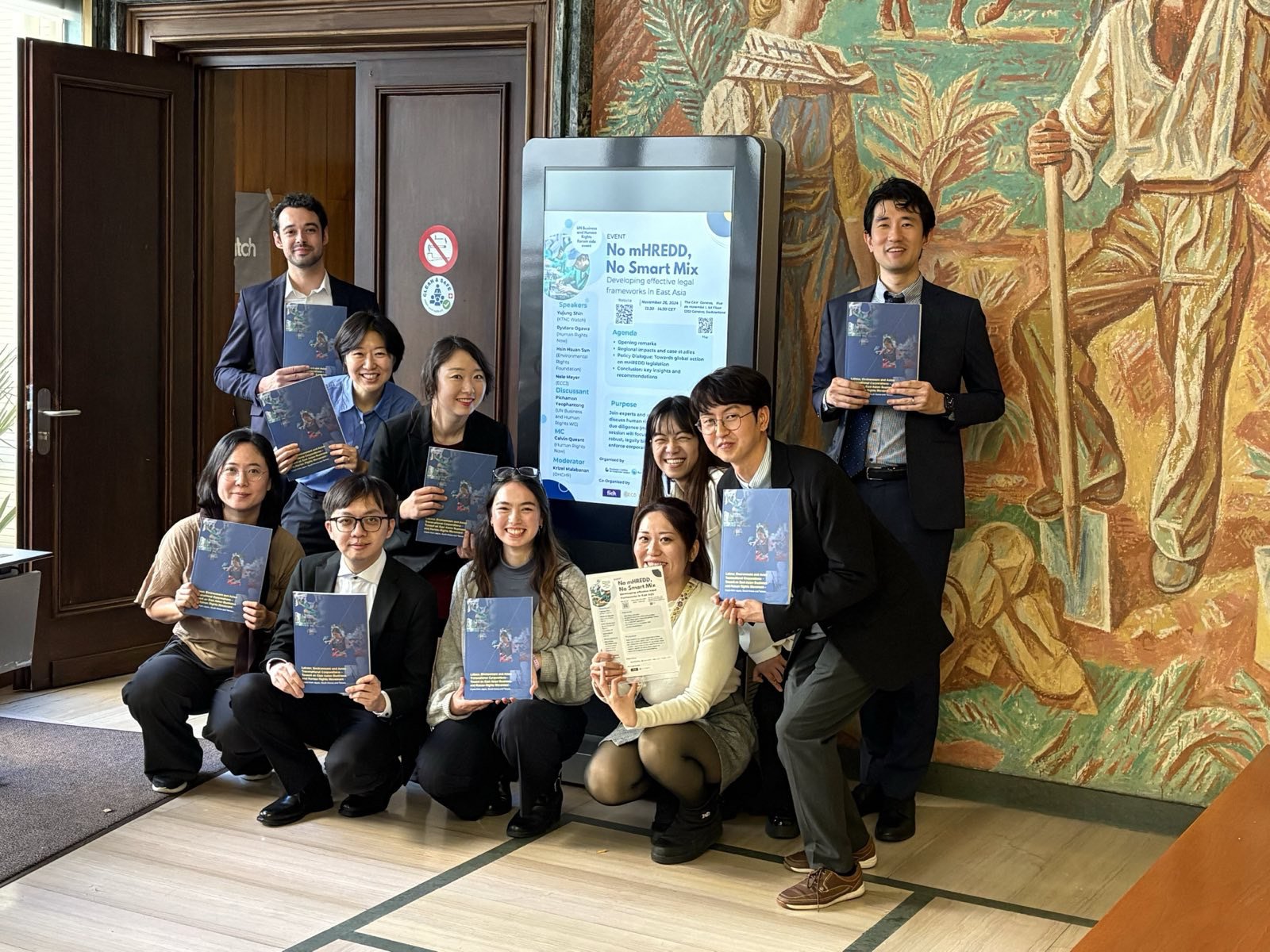Civil society organizations (CSOs) from Japan, South Korea, and Taiwan united this week during the United Nations Forum on Business and Human Rights 2024, calling for mandatory human rights and environmental due diligence (mHREDD) laws in East Asia. In a standing action and a high-profile side event, CSOs highlighted abuses by major corporations, including Samsung Electronics, Mitsubishi Corporation, and Formosa Plastics, urging governments and global leaders to act.
A Unified Call for Accountability
On November 25, in front of Geneva’s iconic Broken Chair monument, representatives from KTNC Watch (South Korea), Environmental Rights Foundation (Taiwan), TTNC Watch (Taiwan), and Human Rights Now (Japan) issued a joint statement. The statement underscored the far-reaching impacts of East Asian corporations across global supply chains and how the lack of binding regulations enables human rights violations and environmental degradation. CSOs demanded immediate legislative action to close these regulatory loopholes and enact mHREDD laws.
More than 30 NGOs around the globe endorsed the statement, including International Federation for Human Rights(FIDH), OECD Watch and Asian Forum for Human Rights and Development(FORUM-ASIA). You can read the full text of the joint statement here.

Exposing Corporate Impacts: A Call for Stronger Regulations
The November 26 side event at the Forum Asia conference room spotlighted systemic abuses through case studies, including Samsung’s environmental violations in Vietnam, supply chain abuses in Japan’s tuna industry involving Mitsubishi Corporation and others, Taiwanese involvement in Indonesian nickel mining, and Formosa Plastics Group’s troubling history in Vietnam. These cases underscored the need for binding laws to curb corporate negligence and protect vulnerable communities.
Yujung Shin from KTNC Watch cited Samsung’s environmental violations in Vietnam as a clear example for the need for mHREDD laws that regulates the global supply chains impact of East Asian conglomerates.
Hsin Hsuan Sun of Environmental Rights Foundation and TTNC Watch added, “Despite the global footprint of Taiwanese companies in sectors like garments, electronics, and semiconductors, there are no effective legal tools for victims overseas to seek justice. Even companies with long records of abuses, like Formosa Plastics, continue to operate with impunity.”
Ryutaro Ogawa from Human Rights Now urged East Asia to learn from Europe’s experience with the Corporate Sustainability Due Diligence Directive (CSDDD). “Meaningful stakeholder engagement must also become a mandatory part of our domestic laws,” he said.
The policy dialogue that followed featured Pichamon Yeophantong, a member of the UN Working Group on Business and Human Rights, who emphasized the need to align East Asian frameworks with UN Guiding Principles on Business and Human Rights. “Support from business leaders will be key for change. We need ‘the first penguin’ to jump into the water,” she remarked.
Nele Meyer, Director of the European Coalition for Corporate Justice (ECCJ), drawing on Europe’s experience with CSDDD legislation, noted “Effective legislation must ensure enforceability, including strong civil liability provisions.”
The event also marked the launch of the report "Labour, Environment and Asian Transnational Corporations – Toward an East Asian Business and Human Rights Movement." The report provides an analysis of business and human rights policies in Japan, South Korea, and Taiwan, as well as case studies illustrating the urgent need for robust legal frameworks to hold corporations accountable. You can download the report from here.

Growing Pressure for Corporate Responsibility
As home to globally influential corporations, East Asia faces growing demands for companies to uphold higher standards of corporate responsibility. Without binding legislation, advocates warn, human rights abuses and environmental harm will continue unchecked. These events spotlighted the urgent need for action and set the stage for stronger global and regional cooperation.
Media Contact
- Human Rights Now (HRN): info@hrn.or.jp
- Environmental Rights Foundation (ERF): hhsun@erf.org.tw
- Korean Transnational Corporations Watch (KTNC Watch): ktncwatch@gmail.com
Photos, full quotes, and further details are available upon request.